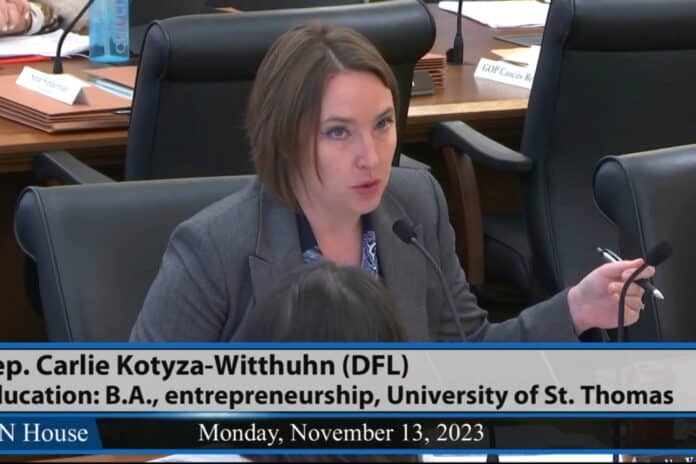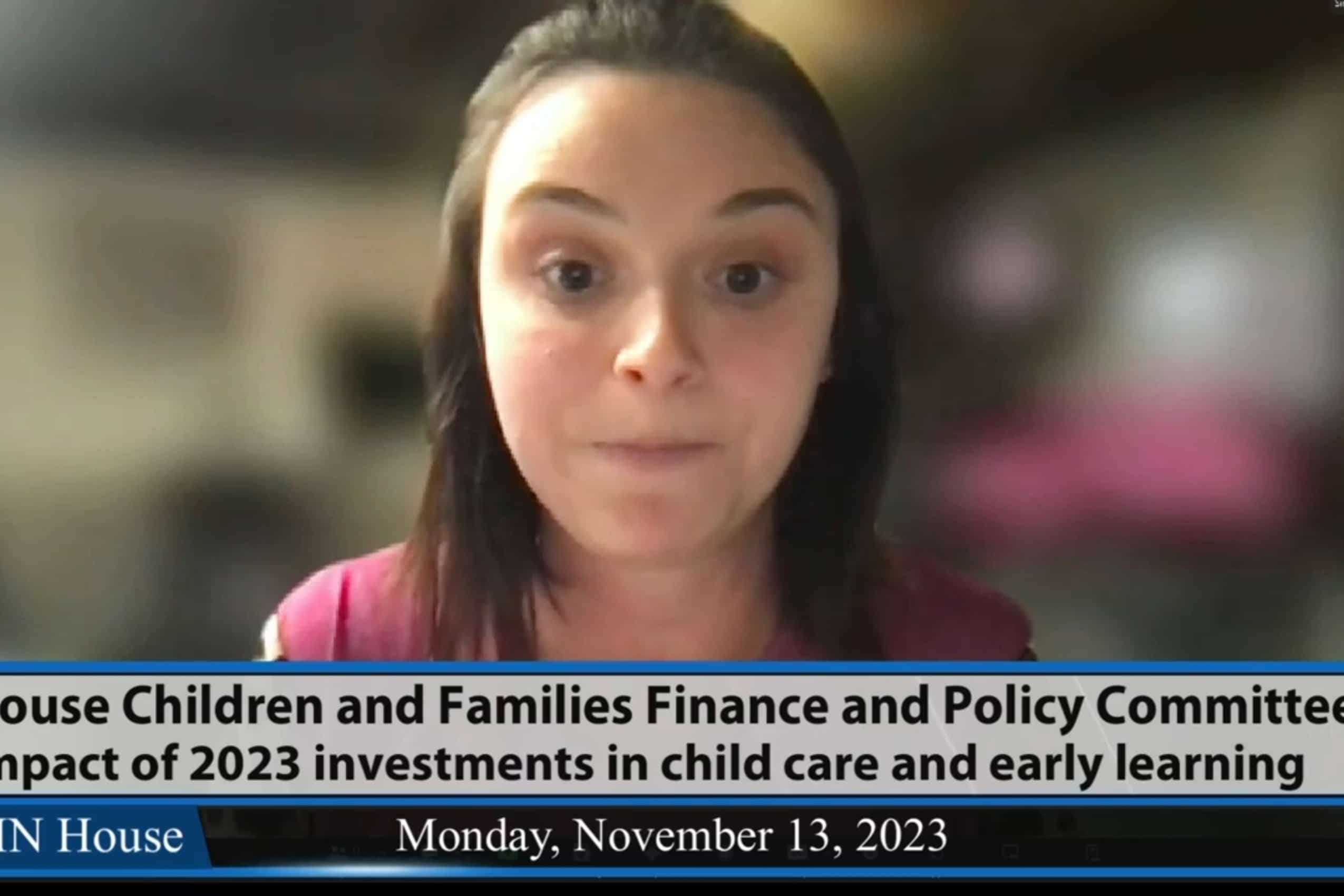
The next legislative session doesn’t begin for another three months. But a duo of DFL legislators who represent swing districts up for re-election in 2024 and 2026 are getting a head start on a bill they plan to push early next year that would provide significant childcare subsidies for Minnesota families above the median household income.
Rep. Carlie Kotyza-Witthuhn of Eden Prairie and Sen. Grant Hauschild of Hermantown are calling their bill-to-be the “Great Start Affordability Program.” And they say it would aim to subsidize the cost of daycare and preschool for families who are currently just above the income threshold to qualify for state-funded Early Learning Scholarships. Kotyza-Witthuhn and Hauschild said in a hearing at the State Capitol on Monday their goal for such a program is to shore up enough state funding to bring the childcare costs down for Minnesota families to just 7 percent of their monthly income.
That would mean a family that makes $100,000 annually and has two children under 5 would see just $134 a week come out of their own pocket to pay for childcare. The rest would come from the state. Right now that same family likely pays anywhere between $500 and $700 per week for full-time childcare for two children under 5 years old, according to the Economic Policy Institute’s analysis of childcare costs in Minnesota.
On Monday, the House Children and Families Finance and Policy Committee held an informational hearing on the proposal, which is not yet in bill form because the legislature will not be in session until Feb. 12. The hearing comes just six months after Gov. Tim Walz signed a tax bill that provides childcare tax credits for families that is means tested based on income level.
But that hasn’t stopped Kotyza-Witthuhn and Hauschild from gathering supporters of their legislative initiative to testify about what they believe is a growing and unsustainable gap in childcare affordability for the middle class.
“What we are discussing today is actively in the works in the lead up to this next session,” Kotyza-Witthuhn said in the hearing on Monday. “As testifiers and advocates have mentioned earlier we are seeing this tremendous gap in support for more than 75 percent of Minnesota families — those who earn more than $60,000 a year. And we know that those families continue to struggle with the costs of early care and learning.”
One of those is Brittany Kjenaas, a healthcare supply chain manager who lives in Mount Iron with her husband and 3-year-old daughter. She testified in support of the Great Start Affordability Program at the Capitol on Monday. Kjenaas’s husband is a miner on the Iron Range. She drives her only child 15 minutes each morning to Iron Range Tykes Learning Center and says her family of three can barely afford the five-day-a-week preschool program. They make too much money to qualify for the state’s current Early Learning Scholarship program. She says if they could pay a “few thousand dollars less for childcare, we would be able to take our daughter to the zoo, go see a movie, and even plan a fun road trip, because we would be able to without the stress of how much it would cost at the end.”

“Unless something is done to lower the cost of childcare she will remain our only child,” Kjenaas said. “We pay more monthly for childcare than we do our mortgage and there is no way we can double that and still afford to live.”
Hauschild, a first-term state senator with two young children, who says he will sponsor the bill that doesn’t yet have an estimated cost or funding source, says he too has had the same conversations with his wife, who is employed as a nurse.
“Families like mine have considered having a third child, and I talk about it openly; we have decided not to do that at this time because of childcare costs,” Hauschild said. “While we did a lot for childcare this last session, especially as it relates to childcare stability for families most in need, we also need to support middle-class families who are struggling to make ends meet.”
Program feels like ‘”Feeding Our Future’ on steroids,” Republican legislator says
Republican legislators who sit on the committee were skeptical the program will solve a larger problem they say stems from overregulation of in-home childcare providers.
“I just don’t want to see us have the government [continue to] take over our family daycare centers” said Rep. Brian Daniels of Faribault, who serves as the Republican lead on the House Children and Families Finance and Policy Committee, and said his wife quit her job as a paraprofessional to start her own in-home daycare when their now grown children were young.
Another member of the committee, Rep. Walter Hudson, R-Albertville, questioned the oversight ability and taxpayer price tag for such a program.
“The idea or the essence, from best I can tell, is [the bill sponsors] just want to pay for everybody’s childcare,” Hudson said during a radio interview on Tuesday with Jon Justice of KTLK AM 1130 in the Twin Cities. “Just pay for all of it. And the way they are going to do so is by directly providing payments to providers, much like Feeding Our Future. We are talking about Feeding Our Future on steroids.”
But those families who are in that gap between qualifying for childcare assistance and not being able to afford market-rate costs say such a program could be a lifeline.
Daniel Rogge of Edina earns $63,000 a year as a single parent of two boys under age 5. He’s recently divorced and told the committee considering expanding subsidies to families like his that their mother doesn’t help “co-parent.” He spends between $600 and $700 per week on childcare.
Rogge said his testimony to the committee is his “personal plea to the state to please consider reform to this antiquated, outdated and biased system for approval for state-funded programs.”
Hauschild and Kotyza-Witthuhn are working on the middle-class childcare subsidies proposal as legislators who represent constituencies that elected them by razor thin margins in recent years. In 2018, Kotyza-Witthuhn unseated incumbent Jenifer Loon by just more than 200 votes in a west metro suburban district, though Kotyza-Witthuhn significantly expanded on that margin in 2020 and 2022. In 2022, Hauschild won his senate race for an open seat vacated by retiring Tom Bakk by just more than 700 votes. He isn’t up for re-election until 2026, but voted in near lockstep with Democrats in the Senate during the 2023 session.
Hank Long
Hank Long is a journalism and communications professional whose writing career includes coverage of the Minnesota legislature, city and county governments and the commercial real estate industry. Hank received his undergraduate degree at the University of Minnesota, where he studied journalism, and his law degree at the University of St. Thomas. The Minnesota native lives in the Twin Cities with his wife and four children. His dream is to be around when the Vikings win the Super Bowl.












